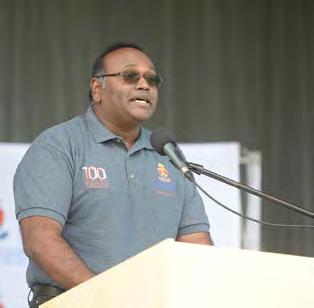
3 minute read
Normal Assessments in an Abnormal World
recommendations as well as present and justify their decisions to the other teams involved in the project.
During their honours year, finance students need to achieve a range of learning goals and objectives. In view of these requirements, an integrated and collaborative project is an excellent tool to assist students to achieve these goals. In short, the Boerie-project in 2019 taught students more about thinking critically and practically applying knowledge and skills in a business environment than many sit-down lectures could ever achieve. Students were also challenged in terms of their commercial literacy and interpersonal skills through the team-based approach. All these factors took the project to the next level by crossing the divide between faculties and disciplines.
As could be expected with any interdisciplinary project, it was challenging to balance the schedules of the students from two different faculties and to keep the students focused during such a lengthy project. However, packaging the project in smaller units with multiple deliverables enabled students to stay engaged and to use each such step to improve their skills.
A similar project ran successfully in 2020. Despite COVID-19 restrictions complicating matters, the availability of online meeting tools made it possible to transfer the project to an online environment seamlessly.
Paper-based assessments offer the opportunity to assess judgement and integrated application at an advanced level, which may not always be achievable with typical online-based assessment techniques. The move to an online environment presented a challenge to the assessment practices of the Postgraduate Diploma in Accounting Sciences, which requires lengthy and unstructured case studies in order to assess numerous competencies at this advanced level.
The ‘normal assessment’ practice was thus adapted to achieve assessment objectives. Andrew van der Burgh explains what was done. Case studies were retained, together with their unstructured answers, in the form of a written assessment. The case study was adapted to ensure visibility on a smart device and, together with the ‘required’ part of the case study, password protected. These documents were then released the day before the assessment to avoid typical technical issues associated with online assessment on the day of the assessment. A detailed instruction document and ethics declaration were also opened in advance. On the day of the assessment, the passwords for the documents were distributed via several channels (email, clickUP and WhatsApp). Students then proceeded to write the assessment on paper as usual, without concerns relating to issues arising in online-based assessments. Once the assessment had been completed, students scanned their answer scripts to PDF using their mobile phones and uploaded them to clickUP. A dedicated upload time was announced, and student uploads were monitored using tools in clickUP to ensure they occurred within that period. Late or incomplete submissions were penalised. Students were advised to communicate upload issues immediately via WhatsApp. Once uploaded, the PDF could be marked using various tools (among others, the online marking tool) and later returned to students.
Andrew van der Burgh
Two of the major benefits of this method, which was also applied in a slightly revised format in traditional venue-based assessments during 2020, is immediate feedback to students and enhanced integrity during perusals as the marked script is stored in PDF format. The solution can be released before marking is complete, which allows students to self-reflect as they have a copy of their uploaded PDF script. In addition, online perusal is facilitated as the re-mark of a script is done on the original marked script retained by the lecturer.
The future is upon us and we have to adapt and make the best of the cards dealt to us—even if it is by making the abnormal normal.










